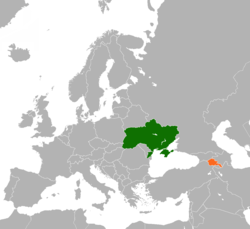The main principles of economic cooperation between Ukraine and Armenia were outlined in the Treaty of Friendship and Cooperation between Ukraine and Armenia, which entered into force on May 26, 1997. Today, Ukraine and Armenia cooperate within the framework of the "Joint Intergovernmental Ukrainian-Armenian Commission on Economic Cooperation". Ukrainian exports to Armenia are metallurgical, chemical, agricultural, food goods and equipment, grain crops, alcoholic beverages, buses, and tires. Armenian exports to Ukraine electrical products, brandy, juices, tomato paste, mineral waters, cigarettes, and agricultural goods.[2] For 9 months in 2015, the trade turnover between the countries amounted to 94.2 million US dollars, while the trade in goods amounted to 76.7 million dollars.[3]
More information Year, Exports from Ukraine to Armenia (millions) ...
Exports from 2017-2020[4]
| Year |
Exports from Ukraine to Armenia (millions) |
Exports from Armenia to Ukraine (millions) |
|---|
| 2020 |
126.98 |
26.40 |
| 2019 |
148.46 |
24.61 |
| 2018 |
152.47 |
18.25 |
| 2017 |
114.4 |
10.19 |
Close
The turnover of goods between Ukraine and Armenia for January-May 2022 amounted to $33.21 million, decreasing by 27.7%. Ukrainian exports to Armenia in the same period amounted to $29.01 million, decreasing by 26.5%. Armenian imports to Ukraine in the same period amounted to $4.1 million, decreasing by 46.4%. The balance of trade in goods and services for the relevant period in Ukraine is positive, at $24.81 million.[5]
The Ukrainian community in Armenia began to form in the 19th century. As early as 1858, about 150 people were resettled from the territory of Ukraine to the modern territory of Armenia, where the village of Mykolaivka (now Amrakits, Stepanavan district) was founded. The majority of Ukrainians who currently live in Armenia arrived there in the post-WWII period (1945-1990). According to the 2001 census, 1,633 ethnic Ukrainians lived in Armenia by then.
The Yerevan Scientific and Educational Institute, created based on the Yerevan branch of the West Ukrainian National University, operates in Armenia. It is the only Ukrainian higher education institution in the South Caucasus.
